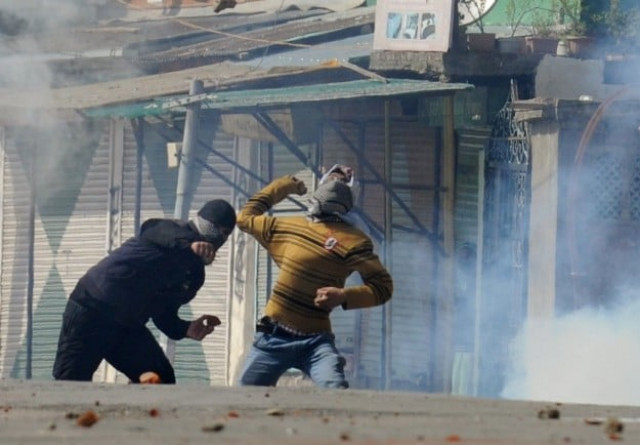The true face of today’s India
If India wants to resolve the Kashmir problem, it would have to seek Pakistan’s cooperation

PHOTO: AFP

The Indian Constitution reflects the country’s founding fathers’ staunch belief in a pluralistic society — a society where the minority groups within could maintain cultural differences, but share overall political and economic power. So, the fundamentalists championing the Hindutva ideology would first need to amend the fundamental structure of India’s Constitution before they could hope to withdraw the voting rights of Muslims or forcibly sterilise the entire non-Hindu communities of India. Muslims do not even make 15 per cent of the population of India, having increased by a little over one per cent in the decade ending 2015. Therefore, the fear of overtaking the majority can only be described as paranoia or a besieged mentality of extremists.
The issue of resettling Kashmiri Pandits in the Valley in exclusive colonies, however, is a matter of deeper concern. The leadership of the Peoples Democratic Party led by the chief minister of Indian-Held Kashmir (IHK), Mufti Mohammad Sayeed, the Hurriyat leadership, including Syed Ali Shah Geelani, former chief of the APHC, Shabbir Shah, the present chief of the APHC, and Yasin Malik of the Jammu and Kashmir Liberation Front (JKLF) have all welcomed the idea of resettling back in the Valley, the 200,000-300,000 Kashmiri Pandits who had fled to various parts of India during the bloody upheavals of the 1990s. But all four have opposed the BJP government’s plans to settle the Pandits in exclusive colonies fearing that under the garb of resettling them, the BJP wanted to settle non-Kashmiris in the Valley to change its demography, which they believe goes against the spirit of Article 370 of the Indian Constitution under which IHK enjoys a special status.
The other day, a huge rally was held in Srinagar against the proposed move in which slogans favouring Pakistan were raised to the chagrin of the Indian government and its partisan media. The Article in question allows IHK a measure of autonomy just short of independence with the proviso that it could be amended only with a unanimous vote of the IHK state legislature. The late Sheikh Abdullah, wanting perhaps to keep the state independent of both Pakistan and India, had agreed to the clause as a temporary protective proviso to keep the advancing Pakistan Army at bay.
The BJP almost succeeded in taking over the state legislature in the last state elections by sweeping the predominantly Hindu Jammu. It is now the junior partner in the coalition government having agreed not to press for doing away with Article 370. But it seems not to have given up its desire to abolish IHK’s special status. Therefore, the backdoor plot of resettlement — the Israel way — that would enable ‘resettled’ Indians to become voters in the Valley, thus tilting the area’s demography against Article 370. But the people of the Valley seem to have caught the BJP with its hands in the till. Hence, the public reaction, which has turned into pro-Pakistan outbursts on a mass scale. Let it be re-emphasised here, what is happening inside IHK today is India’s problem, not Pakistan’s. However, if India wants to resolve this problem, then it would have to seek Pakistan’s cooperation and start taking a second look at Pervez Musharraf’s long forgotten four-step solution, which the Hurriyat had endorsed.
Published in The Express Tribune, April 20th, 2015.
Like Opinion & Editorial on Facebook, follow @ETOpEd on Twitter to receive all updates on all our daily pieces.















COMMENTS
Comments are moderated and generally will be posted if they are on-topic and not abusive.
For more information, please see our Comments FAQ